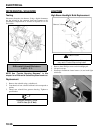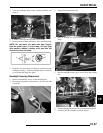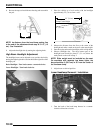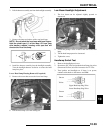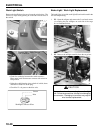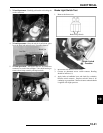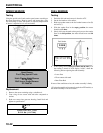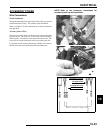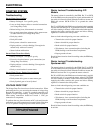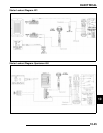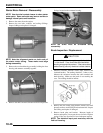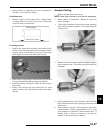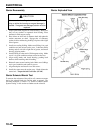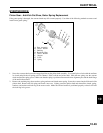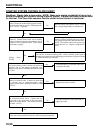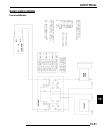
10.44
ELECTRICAL
STARTER SYSTEM
Troubleshooting
Starter Motor Does Not Run
• Battery discharged. Low specific gravity
• Loose or faulty battery cables or corroded connections
(see Voltage Drop Tests)
• Related wiring loose, disconnected, or corroded
• Poor ground connections at battery cable, starter motor
or starter solenoid (see Voltage Drop Tests)
• Faulty key switch
• Faulty kill switch
• Faulty starter solenoid or starter motor.
• Engine problem - seized or binding (Can engine be
rotated easily with recoil starter?)
• Starter lockout malfunction
Starter Motor Turns Over Slowly
• Battery discharged - low specific gravity
• Excessive circuit resistance - poor connections (see
Voltage Drop Test below)
• Engine problem - seized or binding (Can engine be
rotated easily?)
• Faulty or worn brushes in starter motor
Starter Motor Turns - Engine Does Not Rotate
• Faulty starter drive
• Faulty starter drive gears or starter motor gear
• Faulty flywheel gear or loose flywheel
VOLTAGE DROP TEST
The Voltage Drop Test is used to test for bad connections. When
performing the test, you are testing the amount of voltage drop
through the connection. A poor or corroded connection will
appear as a high voltage reading. Voltage shown on the meter
when testing connections should not exceed .1 VDC per
connection or component.
To perform the test, place the meter on DC volts and place the
meter leads across the connection to be tested. Refer to the chart
on 1.47 to perform voltage drop tests on the starter system.
Starter Lockout Troubleshooting- EFI
Models
The starter lockout is controlled by the PDM. Pin 'C' on SSCB
#1 of the PDM senses the transmission signal and determines if
the switch is in Neutral or Park. When the conditions are met, the
PDM will activate SSCB #2 Pin 'N' to ground the starter
solenoid.
Pin 'G' on SSCB #2 of the PDM senses when the brake is applied
and activates SSCB #2 pin ‘N’ to ground the solenoid. The PDM
will allow starting in Neutral or Park without the brake applied.
Applying the brake overrides this system and allows starting
regardless of transmission shift position.
Items to check when diagnosing a no-start condition are:
• Transmission switch for proper function
• Starter solenoid for proper function
• Brake switch for proper function
• Wire harness, loose connections/pins (including the
PDM) leading to and from these components
• Proper ground to frame
Should all these items be found in working order, the PDM may
be at fault.
Starter Lockout Troubleshooting-
Sportsman 450
The starter lockout is controlled by the PDM. Pin 'G' on SSCB
#1 of the PDM senses the transmission signal and determines if
the switch is in Neutral or Park. When the conditions are met, the
PDM will activate Pin 'A' to ground the starter solenoid.
Pin 'H' on SSCB #1 of the PDM senses when the brake is applied
and activates pin ‘A’ to ground the starter solenoid. The PDM
will allow starting in Neutral or Park without the brake applied.
Applying the brake overrides this system and allows starting
regardless of transmission shift position.
Items to check when diagnosing a no-start condition are:
• Transmission switch for proper function
• Starter solenoid for proper function
• Brake switch for proper function
• Wire harness, loose connections/pins (including the
PDM) leading to and from these components
• Proper ground to frame
Should all these items be found in working order, the PDM may
be at fault.
Voltage should not exceed
.1 DC volts per connection



